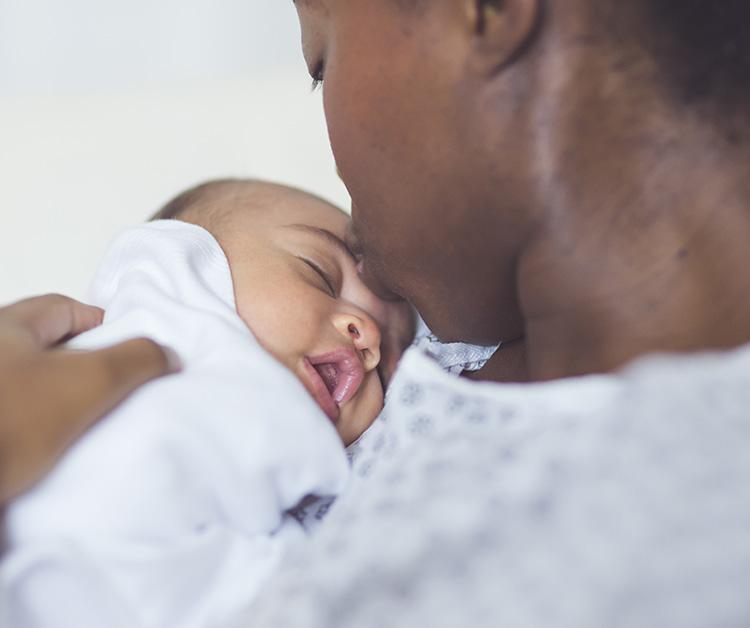Due to maintenance, rewards points for receipt uploads will be delayed. Thank you for your patience!

Some infants want to sleep only when nestled in Mom or Dad's arms. But with some tips from real moms who have overcome this habit, you can help your baby find slumber almost anywhere.
4 Minute Read
When Tara, a mom in Long Island, NY, welcomed her newborn son, she was expecting him to spend most of his day sleeping. What she didn't anticipate, however, was that he'd only sleep when she held him. Whenever she placed her sleeping son down in his crib, he'd squawk until being picked up again—and to help him get the rest he needed, Tara decided to hold him while he slept.
"In those early days and weeks, sometimes you just need to do whatever you can to get your baby some sleep.. I really believe the saying that 'more sleep begets more sleep' for babies."
Tara is far from the only parent whose baby won't sleep without being held. Newborns are especially prone to falling asleep on Mom or Dad—and can you blame them? They've just spent the previous nine months being "held" in the womb, so of course they want a cozy place to snooze. Plus, since they're born without a concept of day and night, they need some time to develop sleep patterns on their own.
With that said, there are a few tricks that can help you usher your baby through the "I only sleep when I'm held" phase into a crib. Here is some advice on how to get your newborn to sleep without being held, from moms whose babies just had to sleep in their arms.
Victoria, a mom in Los Angeles, traded "shifts" with her husband when their newborn needed to be held during naps. "This way, one of us got to bond with the baby while the other took a shower or cooked a meal," she says.
Another option for a newborn who won't sleep unless held is babywearing. "My baby wrap has saved me more times than I can count," says Tara, the mom in Long Island. Another benefit of babywearing is that parents can walk around, keeping both hands free while keeping their sleeping baby secure.
Amber, a mom in Chicago, saw that her baby liked to feel "held" during sleep. "Whenever he became drowsy, I swaddled him in a blanket," she says. "He would settle down when he was wrapped up snug but not tight, and that helped him fall sleep in his crib." Another one of her essentials? A pacifier. "It's called a pacifier for a reason," she jokes. "Something about the sucking motion made him sleep better."
"For the first month, my son wanted to sleep only in our arms," says Victoria, "but as he got older, I needed him to sleep in his crib." In her case, she used white noise and blackout curtains to help her baby associate this environment with naptime. "At first, I'd put him in his crib and stay close until he fell asleep. Over time, I'd step away as he nodded off, until eventually he was comfortable going to sleep on his own."
Whether you hold your sleeping baby once or one hundred times, make sure you do so only when you're alert and awake. Sharing your bed (or otherwise sleeping next to your baby) is dangerous, so if you're feeling drowsy, it's important to find a more suitable sleeping place for the little one.[1] The American Academy of Pediatrics recommends safe sleep places such as flat cribs, bassinets, and play yards. Avoid inclined sleepers, rockers, and swings; they can pose safety risks, and at best, your baby may become reliant on the motion they provide.[2] When your baby is comfortable sleeping in a safe place made just for them, they'll be more likely to sleep long and well—and that means everyone gets a break.
With a few smart tips, you can help your baby sleep happily (and safely) in their own crib.
References:
All information on Enfamil, including but not limited to information about health, medical conditions, and nutrition, is intended for your general knowledge and is not a substitute for a healthcare professional's medical identification, advice, or management for specific medical conditions. You should seek medical care and consult your doctor or pediatrician for any specific health or nutrition issues. Never disregard professional medical advice or delay seeking medical treatment, care, or help because of information you have read on Enfamil.